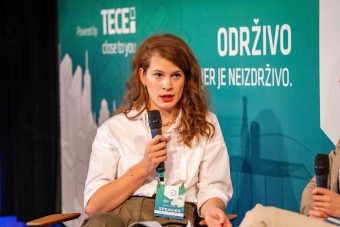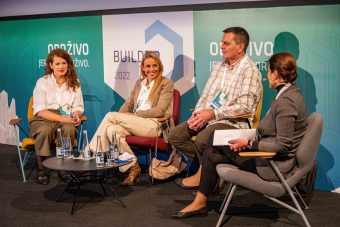
The construction industry in Serbia is at the beginning of a transformation that should enable, through the application of innovative and sustainability standards, to reach European and world trends in this branch of the economy. With a reliable partner, reaching long-term and sustainable solutions is certainly easier. Jelena Jolović, manager of the Novaston platform, reveals to us what kind of innovations they bring to the domestic market.
EP: Novaston is a leader when it comes to raising sustainability standards. What sets you apart from the competition, and what do you offer to your clients?
Jelena Jolović: Four different sectors operate within the Novaston platform, which has been successfully operating for 10 years on the domestic and regional market. They cover a wide range of services: from project design and development, property management, valuation, and mediation in the sale and letting of real estate to marketing. This is exactly what sets us apart in the market – within our company and in agreement with the client, we create a custom-made approach to work that can be unique in our market.
We approach each client individually, and with all previous experiences, we jointly create a model that best suits the needs and situation in the market. When it comes to applying sustainability standards, we can say from experience that the market is becoming aware of the importance of such projects in the community. When the investors are companies from the European or American market, they have the initiative, and the facilities are designed and executed according to the latest standards.
IN FOCUS:
EP: What are the biggest challenges in the construction industry that you have encountered in your work, and how do you overcome them?

Jelena Jolović: There are always two main areas of challenge: budget and time frame. Implementation of sustainability standards is easiest in the design process. At that moment, when the result is not so tangible, the biggest challenge is to convince the client to push the boundaries and set new standards in terms of financial profitability.
The process is more demanding if the client does not come from an environment where energy efficiency is a priority. Still, that requirement was imposed by the user of the facility, i.e. the tenant. However, from experience, we see that in the end, the client sees all the benefits that energy efficiency brings to him in the later use of the facility.
Sometimes it is not possible to implement all the measures required by the certification body due to the underdeveloped market in Serbia, so we have to find innovative solutions to achieve points while staying within the limits of domestic production. That is why we constantly emphasize the importance of the state’s participation through incentives for investors, but also other types of support, such as the opening of waste sorting and recycling facilities.
EP: What can you tell us about the LEED Gold certificate, and which buildings in Serbia have it or will soon receive it?
Jelena Jolović: The LEED Gold (Leadership in Energy & Environmental Design) certificate was established in 1994 on the American market, and a decade later, we already had the first certified facilities in Serbia. LEED certification is important for investors who show responsibility in business and set an excellent example in the construction industry. A facility designed and constructed according to LEED Gold or Premium standards has reduced electricity and water consumption, lowered CO2 emissions by 10 to 30 per cent, reduced operating costs and increased the value of the facility. The LEED certificate is also extremely important for the end users of such facilities. They are healthier and happier, have better working conditions, more natural light and greenery, but also the feeling that they contribute to the betterment of society. One of the projects we are currently working on with Schneider Electric and investor Aleksandar Gradnja is in the process of obtaining the LEED Gold certificate. It is about the reconstruction of the industrial production hall of the Novkabel complex in Novi Sad, which will have 17,000 m2 upon completion.
Interviewed by: Milica Radičević
Read the story in the new issue of the Energy portal Magazine ENERGETIC EFFICIENCY

